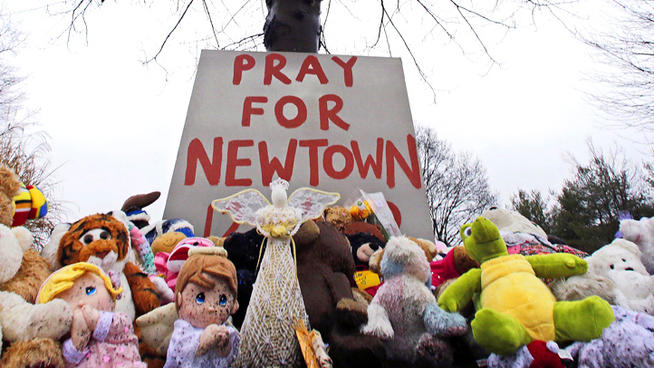It’s hard not to get where Newtown, Conn., police officer Thomas Bean is coming from. He responded to last December’s massacre at Sandy Hook Elementary School, where 20 children were among the brutally slain. He now has post-traumatic stress disorder (PTSD) and can’t work. He says he feels dead inside.
Mood music:
CNN reports that Bean might be fired because Newtown says it can’t keep paying someone who is permanently disabled. A letter CNN obtained from the police department said that “he could be fired because Newtown could only afford to pay two years of long-term disability. He has a dozen years left on the job before being able to retire.”
The union that represents Newton police officers may sue. Joe Aresimowicz, House majority leader in the state General Assembly, said the state covers mental healthcare only if the diagnosis comes with physical injuries for long-term disability claims. That mental illness can’t be covered without physical injury tells me there’s stigma busting to be done. It demonstrates a lack of understanding of how mental illness works.
But that — and the heartbreak I feel for this officer — isn’t enough. There’s a bigger issue at play.
When Bean joined the police force, surely he understood, just as those who join the military do, that violence comes with the job. He knew the chances were better than average that he would someday have to go to a murder scene. To his credit, he responded to Sandy Hook on his day off. And obviously, this was not your typical murder scene. Twenty dead children. Even now, almost a year later, the thought of it brings me close to tears. So I can imagine his state of mind after seeing what he saw.
Many officers responded to the scene that day. Surely they remain haunted by what they saw, as well, yet they remain on the job.
That’s no knock against Bean. It’s unrealistic and unfair to assume everyone who experiences trauma should be able to bounce back in the same short period. But functioning in the face of trauma is something we rightfully expect from our public safety professionals. Otherwise, public safety would break down.
If Bean is permanently disabled and can’t do his job any longer, Newtown has to let him go. It sucks, but he should make way for a replacement officer who can do the job.
If it comes to that — and I believe it will — my hope is that Newtown supports Bean and others like him in other ways. A good start would be to get him the help he needs to put his life back together, including a good psychiatrist and career counseling.
There are no bad guys here, only victims. But as a whole, we have to move on.

